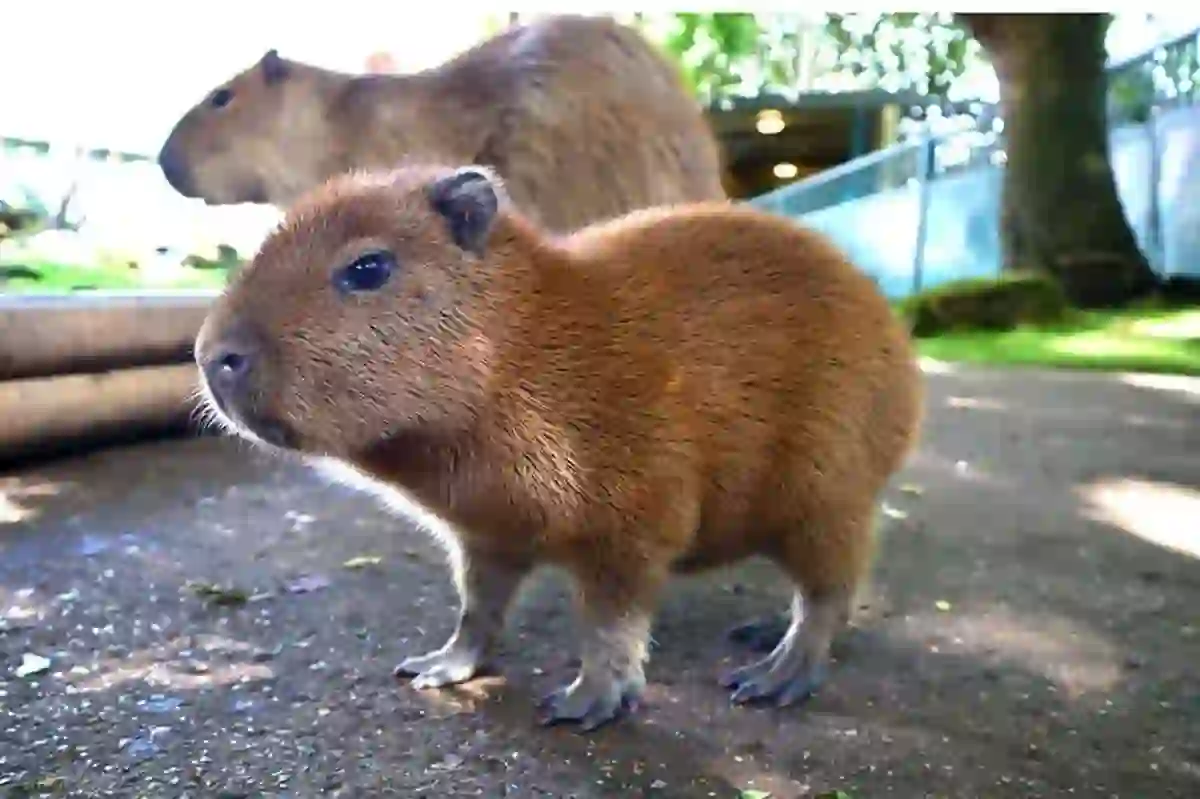.jpg)
Introduction
Capybaras As Pets, The idea of keeping exotic animals as pets might pique your curiosity about capybaras. Although capybaras are not common house pets, their docile nature and sociable behavior have made them a popular choice among animal enthusiasts. Capybaras, native to South America, are the world’s largest rodents and require specialized care and attention. Properly feeding and housing capybaras can be challenging; they need a constant source of water and adequate space to graze. Adequate research is necessary before deciding on having capybaras as pets.
As with any pet, owning a capybara is a considerable responsibility and requires commitment. Capybaras have specific dietary needs that include hay, fresh fruits, and vegetables in their diet. They also need routine veterinary check-ups to avoid potential health issues.
Capybaras are semi-aquatic animals that benefit from access to swimming pools, ponds, or streams. Providing proper shelter options like wooden huts or dog houses will give them the warmth they need at night-time sleep. Keep in mind that they live in large groups in the wild; hence it is best if they have a companion for socializing.
Pro Tip: Due to their specific needs and potential risks for inexperienced pet owners, raising capybaras must follow local laws regarding exotic pet ownership. Consult with vets who specialize in exotic animals before taking up the responsibility of owning one as a pet.
Capybaras may look like oversized guinea pigs, but understanding them is a whole ‘nother animal.
Understanding Capybaras
To understand Capybaras as pets, you need to be familiar with their Appearance and Behavior, Diet and Habitat. This knowledge is crucial if you are looking to adopt this unique animal as a pet. So, let’s explore each of these sub-sections in detail.
Appearance and Behavior
Capybaras: Physical Traits and Characteristics
Capybaras are the largest rodents in the world and possess many unique features. Here are some physical traits and behaviors that define this species distinctly:
- Capybaras have webbed feet and short, round ears which lessen their drag when swimming.
- Their eyes, nostrils, and ear openings are on top of their head which helps them stay alert for potential predators, especially while staying partly submerged in water.
- These creatures communicate with each other through various sounds such as barks, whistles, and growls as well as body language including grooming each other to show affection.
- In addition to being social animals that live in groups of up to 20 individuals strong, Capybaras have a unique digestive system that allows them to digest fibrous plant matter (like hay) effectively.
Capybara Habits Worth Mentioning
Capybaras spend most of their day grazing on grasses near wetlands or other water sources. They enjoy warmth and can sometimes be seen basking in the sun during the early morning or late afternoon hours. Additionally, these rodents use scent glands located around their noses for communication purposes such as marking territory boundaries.
Suggestions for Keeping Capybaras Happy
As highly social animals, capybaras thrive when they have access to plenty of space for running around and interacting with others of their kind. In zoos or similar settings, it’s essential to provide them with opportunities for swimming since they love spending time in the water. Also, keeping them protected from harsh weather conditions is crucial. Informative signage about their habits helps visitors understand more about these curious creatures too!
Looks like capybaras are living their best life, with a diet consisting of grass and a habitat that’s basically a spa retreat.
Diet and Habitat
Capybara Feeding and Habitat
Capybaras are herbivorous animals that mostly graze in the grasslands of South America. These large rodents mostly feed on a variety of vegetation, such as grasses, aquatic plants, fruits, and tree bark. They prefer wetland habitats close to water bodies, such as ponds and rivers.
To understand their diet and habitat in more detail, here is a table showcasing their feeding habits:
| Diet | Habitat |
|---|---|
| Grasses | Wetlands |
| Aquatic plants | Rivers and ponds |
| Fruits | Marshy areas |
| Tree Bark | Forested regions |
Apart from their natural diet and aquatic habitat preferences, capybaras can adapt to human-made environments such as suburban backyards or man-made lakes. They are social animals who often live in groups of up to 20 individuals.
It is interesting to know that capybaras use communal latrines that form dung piles; this behavior makes it easy for them to maintain hygiene within their living area.
You don’t want to miss observing Capybaras’ unique behavior! Plan your next visit to observe these adorable creatures while they swim and bask along the rivers. Think twice before getting a capybara as a pet, because owning one is like having a giant rodent with the strength of a small horse in your backyard.
Owning Capybaras
To own capybaras as pets with legal considerations, housing and environment, and enrichment and exercise as solutions. Get insights into the necessary legal paperwork and zoning requirements to keep these animals as domestic pets, know the type of housing and environment required for their physical well-being, and learn about the enrichment and exercise necessary for their mental stimulation.
Legal Considerations
When considering owning capybaras, there are several legal factors to consider. It is essential to research and understand local and state laws regarding exotic pets. These regulations can include permits, licenses, and zoning requirements. Additionally, it is crucial to understand the potential consequences of violating these laws.
Owning capybaras may require obtaining specific permits or licenses, depending on your location. These animals are considered exotic pets in many areas and may fall under different categories of regulations. Researching your local laws and consulting with animal control or a lawyer can help ensure you are compliant with any necessary requirements.
It is also important to recognize that owning an exotic pet inevitably comes with responsibility and accountability. If a capybara were to cause harm to another person or animal, the owner could face serious legal consequences. To avoid potential legal issues, it is advisable to obtain adequate insurance coverage and invest in proper training and socialization for your capybara.
One incident which highlights the importance of understanding local regulations involved a man who illegally kept a pet capybara in his Brooklyn apartment. When the health department discovered the animal during an unrelated investigation, he faced charges for illegally housing an exotic animal without proper permits and licenses. The man had unknowingly put himself at risk of severe financial penalties by disregarding the law.
Finding a suitable home for your capybara is like Goldilocks searching for the perfect porridge – it has to be just right.
Housing and Environment
When it comes to maintaining suitable living quarters for your capybaras, it is important to ensure that they have ample room to move around and bask in the sun. The recommended threshold for their habitat should be a minimum of 20 feet by 40 feet with a fence that should stand no less than four feet high.
Additionally, capybaras enjoy swimming, so creating a pool or pond on the property will undoubtedly help meet their needs. It is also crucial that there are plenty of foliage and vegetation available as this gives them an opportunity to graze naturally just like they would in the wild.
In addition, installing some sort of heating apparatus could be beneficial during colder months. Capybaras can struggle in temperatures below 60 degrees Fahrenheit so ensuring that they have access to warm shelters or heated pads would arguably make life more comfortable for them.
One capybara owner tells a story about how she modified her backyard pool into a calf-deep wading pool equipped with a ramp so her capys could walk into the water easily. She also created artificial islands out of pots and pans for them to climb upon while still keeping them close enough to the shore. Her pets love lounging on these paddocks while nibbling nearby plant life!
Don’t worry about going to the gym when you own capybaras – these oversized rodents will keep you on your toes (literally).
Enrichment and Exercise
Capybaras: Providing Experiential and Stimulating Activities
Capybaras require a range of engaging experiences that promote physical activity, entertainment, and development. Enrichment practices fall within the scope of promoting healthy animal welfare, and exercises present opportunities for optimal health maintenance.
– Opportunities for water activities pose as enrichment practices:
- Providing a pool or tub mimics their natural habitat while fostering physical fitness.
- Surface-level toys such as rubber ducks incentivize playful engagement.
– Variating up enclosure markers to boost mental stimulation:
- Using different smells, sounds, and textures challenge Capybaras’ senses.
- Hiding treats encourages natural instincts to forage and problem-solve.
– Encouraging general exercise is crucial in maintaining overall health:
- Walking on harnesses promotes cardiovascular fitness and muscle toning.
- Offering outdoor spaces with climbing structures allows physical exertion that can engage curiosity.
Furthermore, incorporating enrichment into daily routines supports Capybara’s emotional well-being since these creatures express social interactions with humans. Creating meaningful connections between owners and these unique creatures can foster trust-based relationships.
In one example, Charlie the Capybara has been deemed a social media star by proudly parading his tuxedos attire. His outgoing personality shines through videos, showcasing how he enjoys playing with toys provided inside his enclosure. Charlie also likes relaxing under the sun while snacking on watermelon provided by his keepers.
Taking care of capybaras is like playing doctor with a giant hamster, without the malpractice lawsuits.
Health and Care
To ensure your Capybara pet’s well-being, it’s essential to focus on their health and care. In order to maintain your pet’s health, it’s crucial to be aware of the common health issues and take necessary steps to prevent them. Regular checkups and care are also crucial in this aspect. Besides, training and socialization form an essential part of your pet’s mental and emotional well-being. Let’s explore each sub-section in detail.
Common Health Issues
The most prevalent health concerns that individuals face nowadays are issues related to their physical and mental health. These can range from minor ailments such as seasonal allergies or common colds to chronic illnesses such as diabetes, heart disease, and cancer.
These conditions often require regular medical check-ups and a disciplined lifestyle with adequate nutrition and exercise.
It’s important to note that mental health issues such as stress, anxiety, depression, and substance abuse can have significant impacts on physical health. They require timely intervention from qualified professionals in order to prevent them from worsening. In addition, screening for various cancers, early detection of diseases through diagnostic tests, and routine vaccinations are key preventative measures against avoidable health problems.
Notably, traditional natural remedies such as yoga, meditation and herbal supplements have gained popularity recently as safe alternatives to conventional medical treatments. While they may be beneficial in certain cases, their effectiveness is not scientifically backed up yet.
According to the World Health Organisation (WHO), an estimated 71 million people die each year due to non-communicable diseases associated with unhealthy lifestyles. Therefore the adoption of healthy habits that encompass both physical fitness and emotional well-being is vital for a long-term healthy life.
Missing your annual checkup is like skipping a season finale of your favorite show – you’ll regret it when you realize you missed a crucial plot twist.
Regular Checkups and Care
Regular medical checkups and healthcare play a crucial role in maintaining our overall well-being. It allows us to catch any potential health issues early on, leading to better treatment outcomes. Scheduling regular appointments with your healthcare provider can help prevent chronic diseases and keep you updated on your current health status.
During these checkups, various screenings and tests are conducted to track important indicators such as blood pressure, cholesterol levels, blood sugar levels, etc. Additionally, providers can offer advice on healthy lifestyle choices such as proper nutrition, exercise routine, stress management techniques, and more.
Neglecting regular healthcare visits may lead to undetected health issues that can worsen over time and lead to complications or even death. Therefore, it is essential to prioritize regular medical checkups as an important aspect of self-care.
Make sure you do not miss out on your health by ignoring scheduled checkups. It is always beneficial to stay ahead of any potential health risks and take necessary steps towards optimal wellness through regular medical checkups and care.
Training a dog is like raising a child, except the dog won’t ask for money when they’re older.
Training and Socialization
The process of developing individuals to interact and function in a given society while acquiring necessary skills and knowledge is known as Behavioral Development. Training and Socialization are essential in promoting this development by providing individuals with the relevant skills, knowledge, values, and attitudes needed for personal growth.
In Behavioral Development, coaching is provided for specific goals. This coaching focuses on boosting individual capabilities and instilling positive behaviors that foster social integration. A well-coordinated training program supports proper mastery of social skills alongside facilitating the adoption of good communication practices.
It’s crucial to note that Training and Socialization enhance personal growth by nurturing the desired virtues expected from an individual in a given society. Such responsibilities include proper behavior, respect, honesty, and trustworthiness which can be attained through training on ethical values.
In healthcare facilities worldwide, it’s been observed that adequately trained professionals improve patient outcomes dramatically. In a recent study conducted by Harvard Business Review titled “When Doctors Get Positive Feedback about Their Abilities, Patients Do Better,” results revealed that doctors who received feedback from their patients performed better than those who didn’t.
Taking care of your health is no laughing matter, but a good sense of humor can make the journey a lot less painful.
Conclusion
After evaluating the potential of keeping capybaras as pets, it is evident that they require a considerable amount of care and attention. Not only do they need ample space to roam around, but their diet and medical needs also demand significant investment. While capybaras can make affectionate companions, it is crucial to understand the responsibilities and requirements before deciding to bring one home.
Moreover, owning a capybara could be subject to local laws and regulations depending on the country or state. It is essential to gather information regarding permits or licenses required for ownership beforehand. Neglecting these rules could result in fines or even confiscation of the animal.
Frequently Asked Questions
Q: Can capybaras be kept as pets?
A: Yes, capybaras can be kept as pets for those with proper licenses and suitable living conditions.
Q: Are capybaras easy to take care of?
A: No, capybaras require a lot of care and attention. They need a large enclosure, a specific diet, and plenty of social interaction.
Q: Can capybaras live indoors?
A: It is not recommended to keep capybaras indoors as they need plenty of outdoor space to roam and graze.
Q: Do capybaras get along with other pets?
A: It depends on the individual capybara and the other pets. Capybaras are social animals and can get along with other pets, but introductions should be done slowly and under supervision.
Q: Do capybaras require a special diet?
A: Yes, capybaras require a specific diet consisting of hay, fresh vegetables, and specialized pellets.
Q: Are capybaras legal to keep as pets?
A: In some states, capybaras are legal to keep as pets with the proper licensing and permits. It is important to check with local laws before getting a capybara as a pet.


